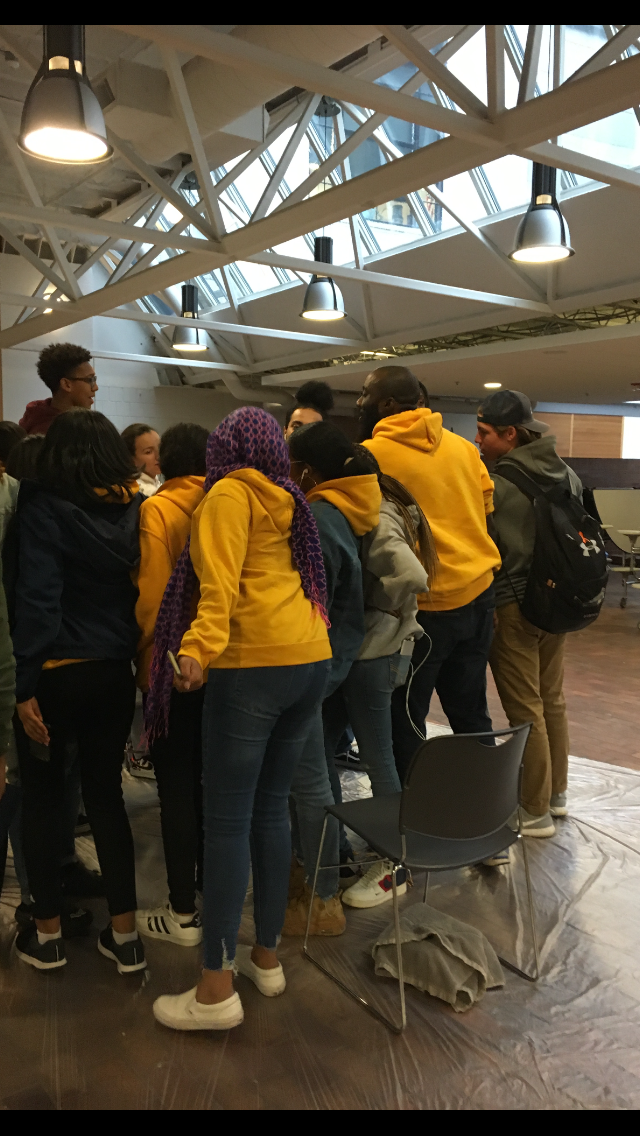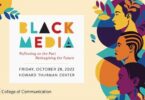By Pamela Fourtounis
BU News Service
CAMBRIDGE — A new record for numbers of pies in the face in one minute was set in Cambridge on World Record Day, Nov. 20.
Cambridge Rindge and Latin School history teacher Kevin Dua took 111 pies in the face at a Black Students Union event as part of a series of activities dubbed “BSU Gives Black.”
BSU students creamed the world record of 72 pies, set in 2017, by hurling 111 shaving cream-filled plates at the BSU advisor while over 100 CRLS students cheered. Principal Damon Smith joined in on the fun, taking a single pie to the face. The whole event was captured on the group’s Instagram live.
Members of the group – about 30 strong – said they decided to hold this and other “Gives Black” events in order to do much more than just boost school spirit.
“The ‘Gives Black’ are really just to show people that we are not just angry black people,” CRLS junior and BSU member Cameron Moody, 16, said the day before pies were thrown. “This group is more than that and we hope that it will have a lasting impact … That we can all just get along and have fun.”
Dua said he is proud of his students and the initiative they’ve taken in planning “Gives Black.”
“To have black excellence displayed and encouraged, it’s fun, it’s inspiring, it’s motivating,” he said. “To show the various dimensions of its members, whether it’s their love for music, film, art or collaboration, to spark that energy that they already have.”
On Dec. 13, the CRLS BSU, along with the newly formed BSU groups from Somerville High School and Arlington High School, will attend a free movie screening of “The Hate U Give,” a film depicting police brutality towards black people, at the AMC theater in Boston Common.
According to Dua, the students applied for the opportunity through a nationwide activism contest and won.
Next semester, “Gives Black” will include a Michael Jackson vs. Beyonce dance battle.
Unapologetic and Active
The day after he and his students set the pie-face record, Dua sat down for an interview in the classroom adjacent to his own, where his students, many of them BSU members, eagerly awaited him. Thanksgiving break had officially started but they didn’t want to leave school just yet.
Dua pulled out his phone and scrolled through old CRLS yearbook pictures of Black Students Unions past, from the 1970s, 1980s and the early 2000s. He explained the demand for a safe space for black students has persisted over time.
“They want to make sure that anything that they do is unapologetic to their identities as black individuals,” Dua said, “and at the end of the day they’re students and they’re teenagers.”
Dua added they can go from fun activities, to supporting and tutoring each other, to serious academic discussions.
The Black Students Union meets on Tuesdays and Wednesdays in Dua’s classroom. On Wednesdays, they hold their “Desk Series” – discussions on various topics that are important in the U.S. and around the world, including race relations, sexual assault and colorism.
Moody said the discussions allow students to express their feelings and work toward a plan of action on each issue.
“One way or another it ends up back at race, just because anything, if you peel it back enough, can come back to race and color,” Moody said.
Hostility towards BSU has somewhat subsided following last year’s backlash after the release of their first “Minority Report,” a YouTube video where CRLS students spoke candidly about racism they’ve experienced in school. Moody said teachers and students sometimes still give him and his fellow BSU members “weird looks” when they wear their BSU hoodies.
“Teachers might say something that could be seen as disparaging towards the group or towards you, so it’s not really as obvious as it has been in the past year,” Moody said. “It’s mainly little things that your average person wouldn’t think anything of but it actually has a profound impact on the group and the people it is said to.”
Some BSU members are using the group as a launchpad for other projects.
Senior Hermella Kebede’s senior thesis is to develop an anti-racism curriculum for Cambridge schools. She recently received a year-round Nellie Mae Grant to work on it.
“My goal is to have something that progresses over the years,” Kebede, 17, said, detailing a curriculum starting in kindergarten but “increases in complexity” throughout each grade, especially in high school. She also said she hopes to start a newspaper after winter break.
“It’s very isolating to be in this school, because prior to the BSU, whenever people brought up concerns about race people would usually dismiss that because it’s Cambridge,” Kebede said.
“When something happens to you because of your race, it’s usually left to you to grapple with that. Being in the BSU space validates your experiences,” Kebede added.
In her opinion, because of the BSU and its work, the school system and the city as a whole “have to be accountable, because we exposed the issues that were occurring.”





